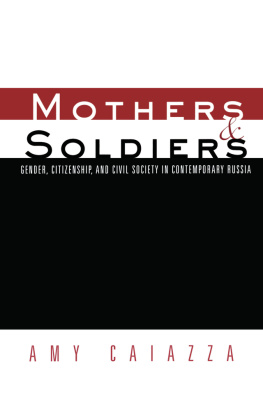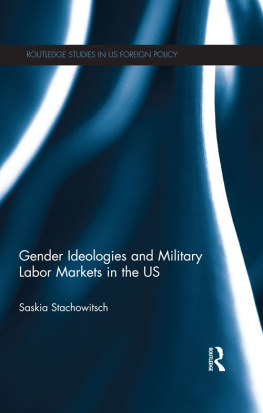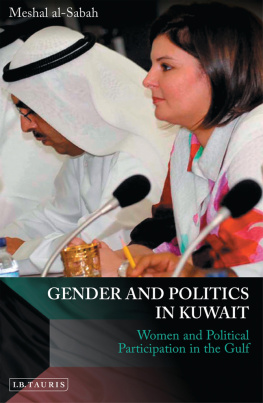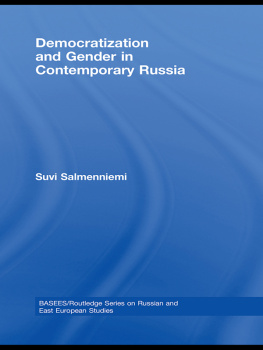Published in 2002 by
Routledge
711 Third Avenue
New York, NY 10017
Published in Great Britain by
Routledge
2 Park Square, Milton Park
Abingdon, Oxon OX14 4RN
Routledge is an imprint of the Taylor & Francis Group, an informa business
Copyright 2002 by Routledge
All rights reserved. No part of this book may be reprinted or reproduced or utilized in any form or by any electronic, mechanical, or other means, now known or hereafter invented, including photocopying and recording, or in any information storage or retrieval system, without permission in writing from the publishers.
Library of Congress Cataloging-in-Publication
data is available from the Library of Congress.
Caiazza, Amy
Mothers and soldiers: Gender, Citizenship, and Civil Society in Contemporary Russia
ISBN: 0-415-93177-0 (hardback)
Publisher's Note
The publisher has gone to great lengths to ensure the quality of this book but points out that some imperfections from the original may be apparent.
For Rick ...
a better fate than wisdom
As a U.S. researcher writing a book on Russian social movements, I relied on the help, support, and guidance of men and women across the world. My Russian friends, colleagues, and acquaintances, who often had little reason to help an American political scientist, went out of their way to provide me with information, suggestions, and time. On the U.S. side of things, my friends and colleagues were equally helpful in providing me with support. I am eternally grateful for their help.
Thanks go to several institutions that helped me along the way: the American Council of Teachers of Russian, which provided technical support for my research in Moscow, and the Political Science Department, Women's Studies Program, and Russian and East European Institute at Indiana University, each of which provided me with financial and academic assistance along the way. The Institute for Women's Policy Research also deserves thanks for giving me the time and support needed to finish my work.
Many academic colleagues provided invaluable input into the project. As always, I take full responsibility for the final product, but I could not have produced it without the important contributions of several people. Jean Robinson not only provided intellectual guidance but was an eternal source of inspiration, strength, and humor. I also relied on the challenging but useful input of Ben Eklof, Judy Failer, and Russ Hanson. Darrell Hammer, whose contributions were missed after his untimely death, always brought his detailed and unsurpassed knowledge of Russia to reviewing my work. The editors of this book's series brought fresh eyes and their own extremely useful suggestions to the project. Barbara Burrell first suggested publishing the book as part of the series, and both she and Dorothy McBride Stetson were invaluable in strengthening my manuscript and bringing the project to completion. Their input improved the book and helped me look at some of the issues raised by it in a new light. Finally, Farideh Kamali at Routledge provided much helpful support and direction.
I would also like to thank all of the friends and colleagues in Russia and the United States who helped me complete my research and maintain my sanity. In Moscow, thanks go to all the men and women interviewed for the project, each of whom donated hours of their time for little reward. I spent enumerable enjoyable evenings discussing feminist theory and Russian politics with Elena Kochkina. Boris, Larissa, Sasha, and Natasha Aliabyev made me and my husband feel like family in their home. Tanya Maksimova and Ina Gapochka became my favorite people to "tea" with. Marina and Tolya Golubovskii, Olya and Sasha Obolonskii, Valentina Bodrova, Nadezhda Shvedova, and the Baskakovs were all generous friends as well. Finally, another American, Carol Nechemias, became my favorite companion for breaks at Moscow's now-defunct Dunkin' Donuts and provided many valuable suggestions and resources for the project.
Many U.S. friends and colleagues were also invaluable sources of support. Barbara Gault and Heidi Hartmann were always encouraging and enthusiastic. All of my other colleagues at the Institute for Women's Policy Research were unbelievably supportive of my work on the project. And I am particularly lucky to have a fantastic circle of friends. I would especially like to thank Mary Ann Cap-piello and Tim Horvath, Mary Dakin and John Aney, Michelle Hynes and Patrick Lemmon, and Laura and Bryan Martin, all of whom made special efforts to support my work and see how things were going along the way.
Finally, of course, thanks to my family. The whole clan of Caiazzas, Blums, Carlsons, and Curleys has been wonderfully supportive and helpful throughout this process. They are integral to who I am and everything I've accomplished.
But the biggest thanks must go to Rick. Thanks to this project, I dragged him halfway across the world, made him read hundreds of pages of drafts, and asked for countless other sacrifices. And he was always there.
In transliterating Russian words and phrases, I have used a modified version of the Library of Congress system. I have eliminated diacritical marks other than the hard and soft signs used in Russian. Where names are well known and have a familiar form in English, I use that form (for example, Yeltsin rather than El'tsin). Where authors or interviewees have used a preferred English spelling for their names in their own publications, I also use it (for instance, Posadskaya rather than Posadskaia). Finally, in the notes and bibliography, where transliterated titles come from secondary sources, I use the original transliteration published there.






